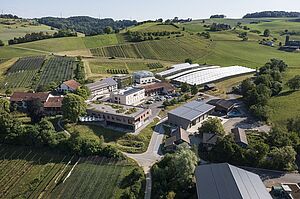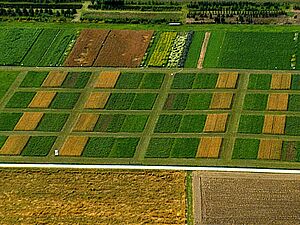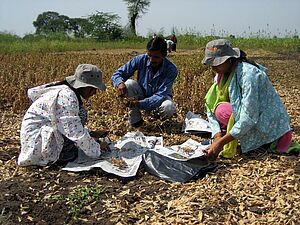Mission Statement
The Research Institute of Organic Agriculture FiBL changes food systems effectively through research and knowledge exchange so that in the future, everyone can eat safely and healthily in harmony with nature.

The Research Institute of Organic Agriculture FiBL was founded in 1973 and has been situated in Frick (canton of Aargau) since 1997. It is one of the world’s leading research and information centres for organic agriculture and employs 300 people in Switzerland. The close links between different fields of research and the rapid transfer of knowledge from research to advisory work and agricultural practice are FiBL’s strengths. The competence of FiBL Switzerland is also sought after beyond the Swiss borders. Thus, FiBL is involved in numerous international projects – not only in research, consultancy and training but also in development cooperation.
FiBL Switzerland operates a vineyard which produces its own wine, a fruit orchard, a farm and a restaurant, all of which are run organically. The Department Suisse Romande in Lausanne was founded in 2016 in order to increase FiBL's presence in the French-speaking part of Switzerland.
Research for farming practice
Since its foundation in 1973, FiBL has worked to establish scientific foundations for organic farming and species-appropriate livestock management. In four research departments, the employees of FiBL Switzerland carry out research on soil sciences, crop sciences, livestock sciences and socio-economic issues.
DOK trial

In Therwil, near Basel, the long-term DOK trial which started back in 1978 is still in progress. It compares biodynamic and organic agriculture with conventional systems. This trial has yielded a large amount of internationally recognized evidence for the ecological benefits of organic farming in comparison to conventional agriculture.
FiBL consultancy: taking know-how to farms
An important goal of FiBL's work is that results can quickly have an impact on practice. Alongside the provision of advice to individual farms and to groups, the most important advisory channels are courses, the monthly journal Bioaktuell, the website www.bioaktuell.ch as well as FiBL’s technical leaflets and videos. Additionally, the specialists at FiBL are available for enquiries by phone or e-mail. The cantons, FiBL and the private organic organizations cooperate closely within an alliance of organic advisors (Bio-BeraterInnen-Vereinigung, BBV).
FiBL publications: important tools for disseminating information
FiBL media place the results of FiBL research within the reach of farmers and other people with an active interest in agriculture, and disseminate these results to advisors. Many of FiBL’s publications are available in several languages and some are distributed internationally.
FiBL technical leaflets provide concise information on a topic and highlight solutions to key problems. They are an indispensable aid to working farmers. In its dossiers, FiBL provides evidence to support the case for organic agriculture.
FiBL publishes the monthly magazine “Bioaktuell” jointly with Bio Suisse, the umbrella organization of the organic farmers' associations. A cooperation arrangement exists between FiBL and the German Foundation Ecology & Agriculture SÖL, the publisher of “Ökologie & Landbau” magazine, which is aimed primarily at experts and researchers in the field. Furthermore, FiBL is a partner of the magazine "Agrarforschung Schweiz", which is published by Agroscope.
Additionally, FiBL publishes several websites on different themes concerning organic agriculture, for instance www.bioaktuell.ch, the platform for Swiss organic farmers. It is published in cooperation with Bio Suisse as well as the advisory services of the cantons.
FiBL – International networks

FiBL cooperates on numerous projects and in technical commissions with experts in Switzerland and abroad.
Founding of other institutes
FiBL Switzerland set up the independent institutes FiBL Germany (2001) and FiBL Austria (2004). It also co-founded the Bioinstitut in the Czech Republic (2004) and the Institut fir biologesch Landwirtschaft an Agrarkultur Luxemburg (IBLA, 2007). Together with FiBL Germany and FiBL Austria, FiBL Switzerland founded FiBL Europe in 2017 to represent all FiBL institutes in Brussels (Belgium).
Bioinstitut Tschechien
Institut fir biologesch Landwirtschaft an Agrarkultur Luxemburg
Financing
The research institute and its advisory services are financed by the Swiss Federal Office for Agriculture (FOAG), the Federal Office for the Environment (FOEN), the State Secretariat for Economic Affairs (SECO), the Swiss Agency for Development and Cooperation (SDC), cantonal and municipal agricultural authorities, private organizations (Coop, Bio Suisse, Hiscia, Migros and others) and individuals. Furthermore, FiBL is financed by means of numerous pieces of commissioned research and is involved in many EU research projects.



